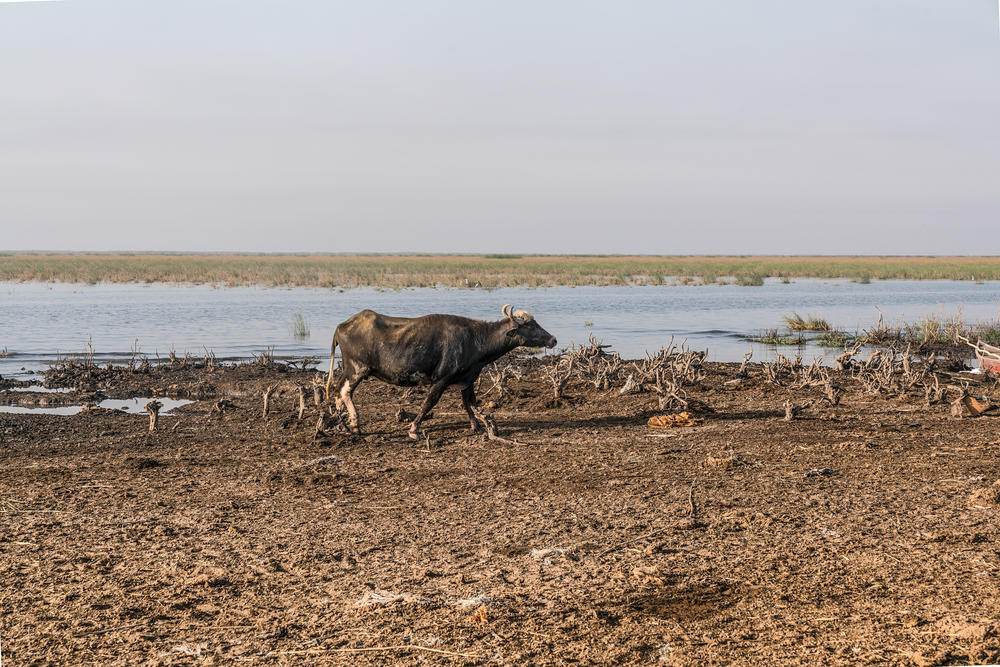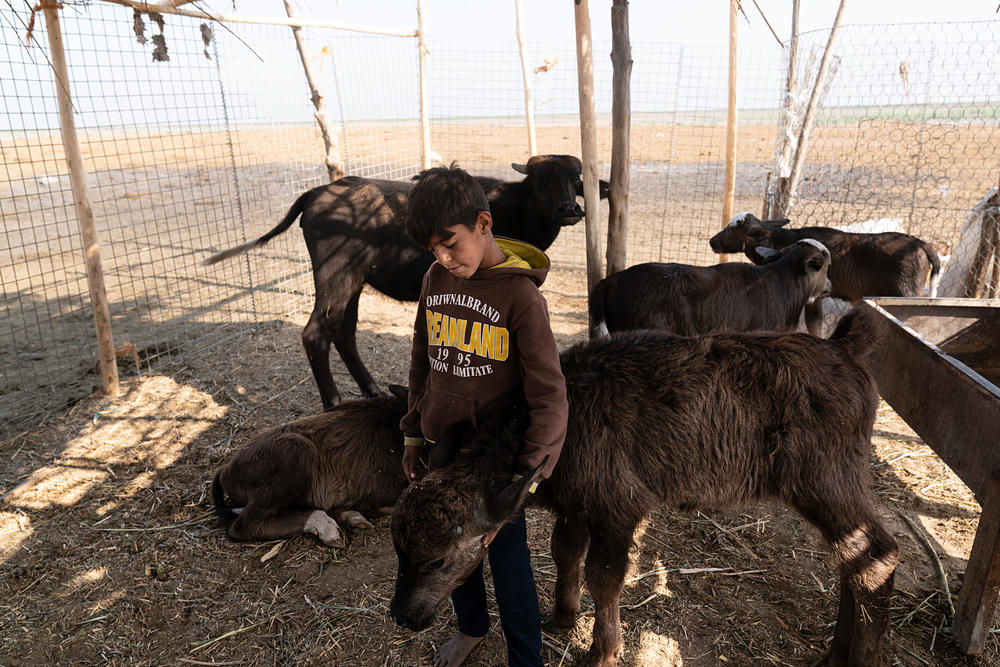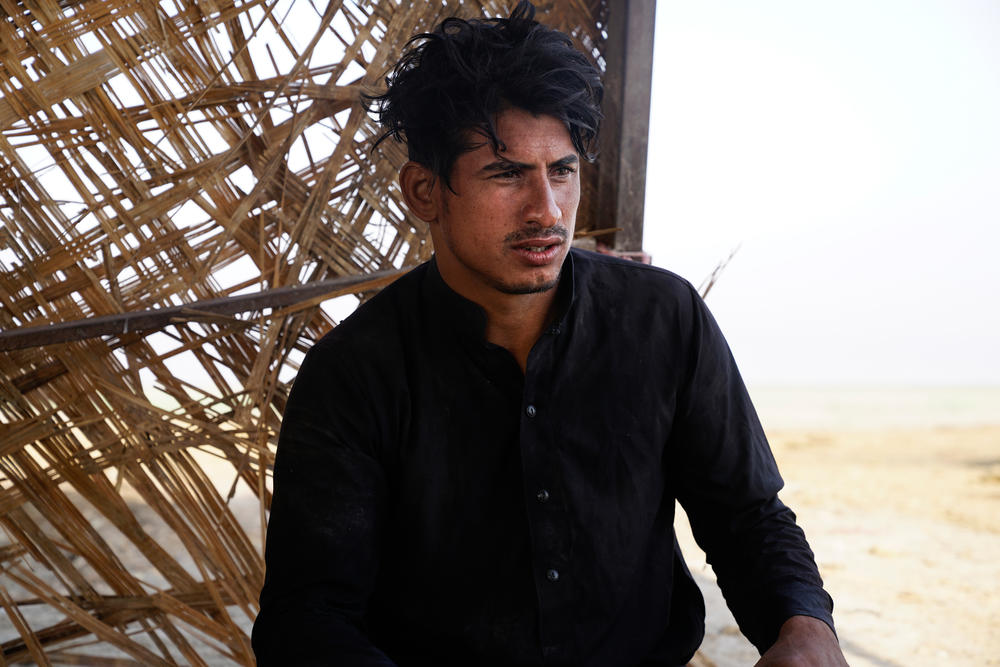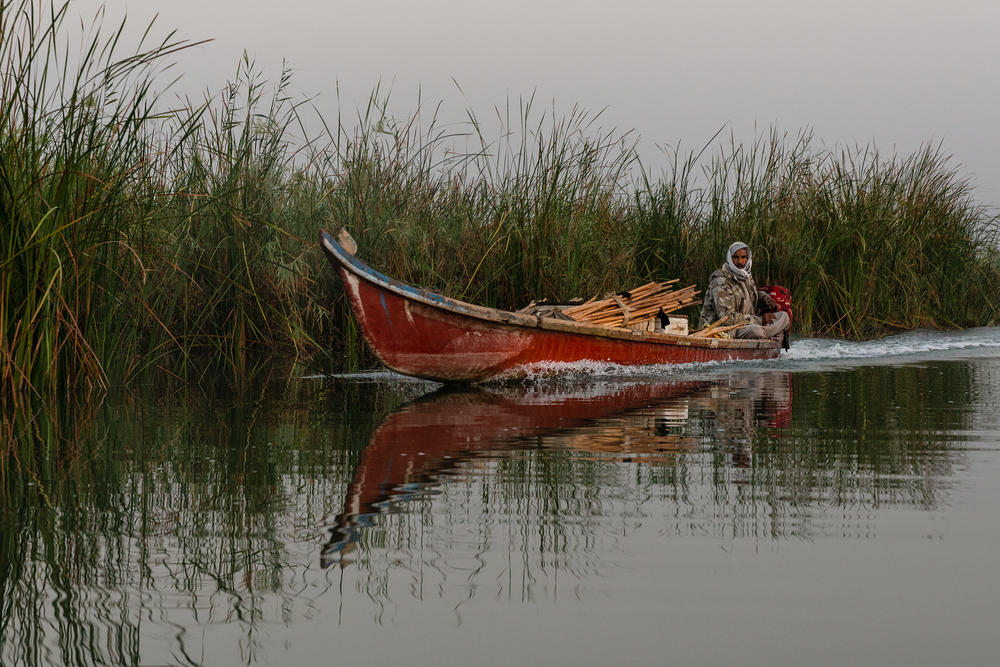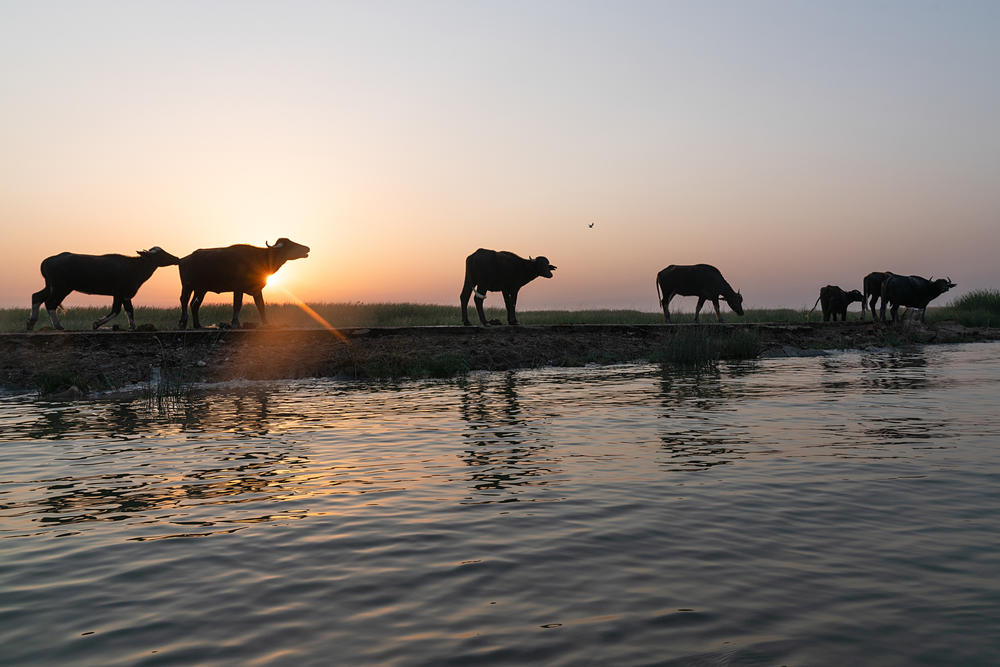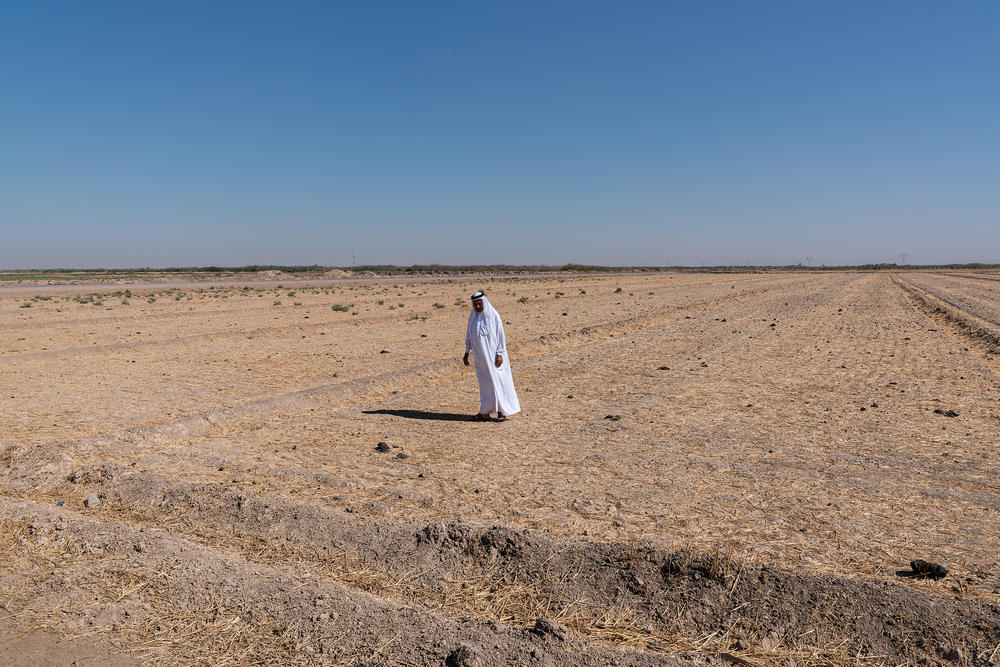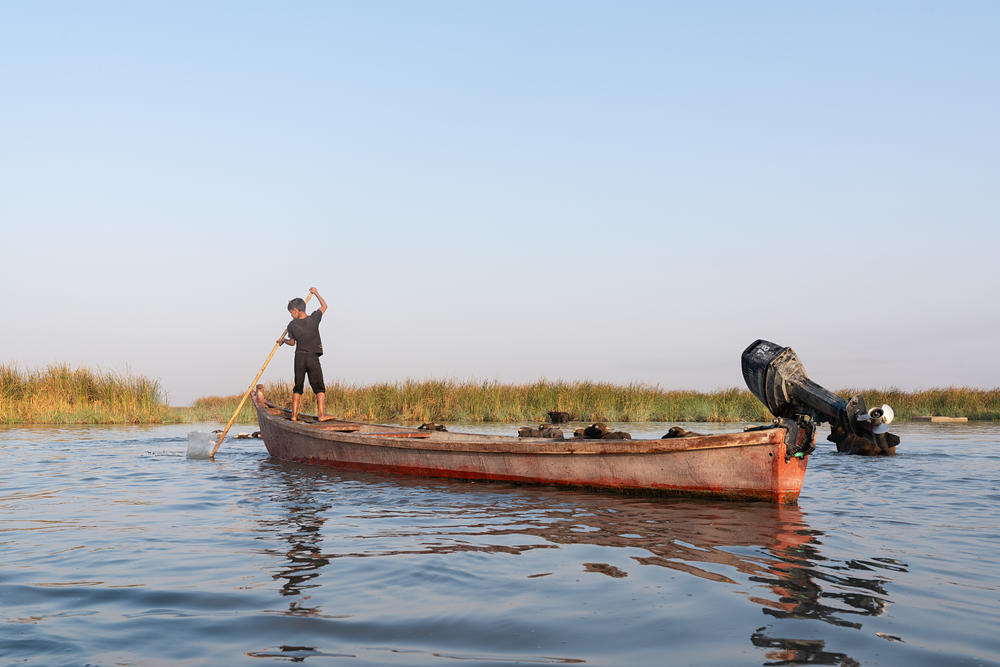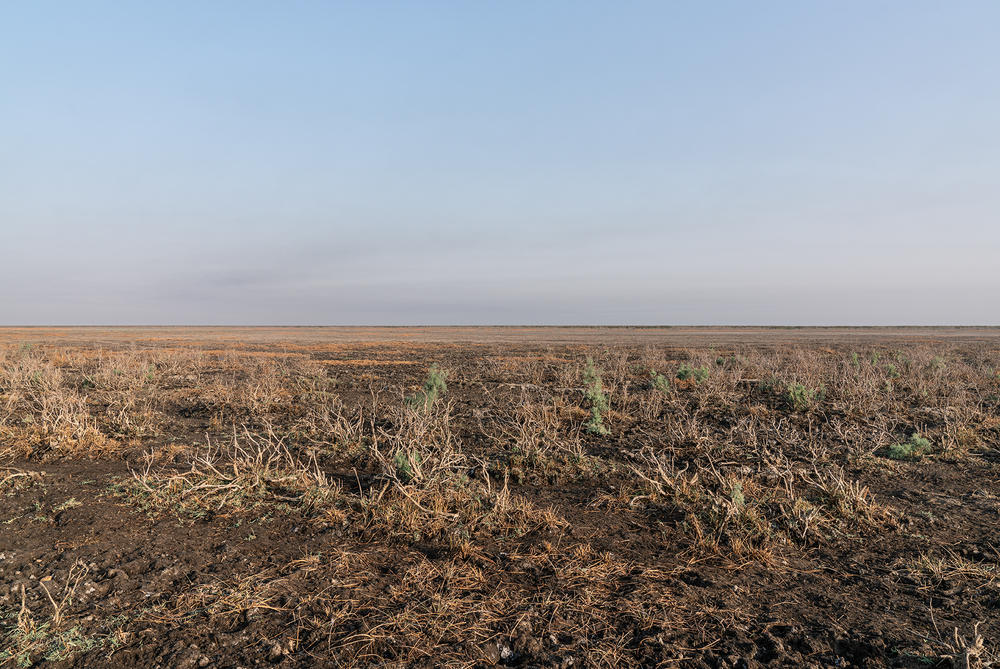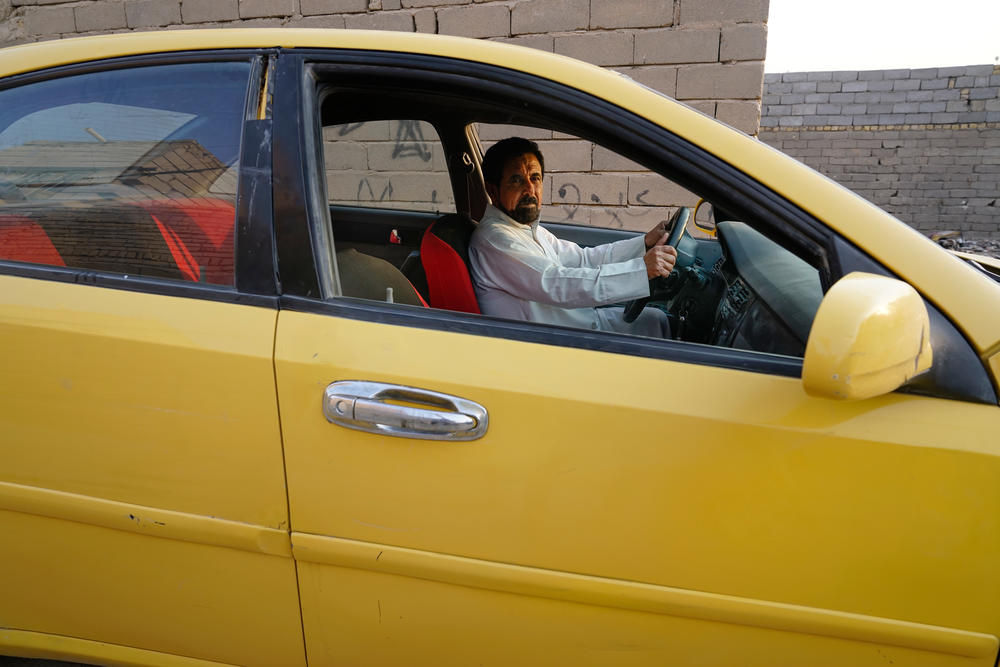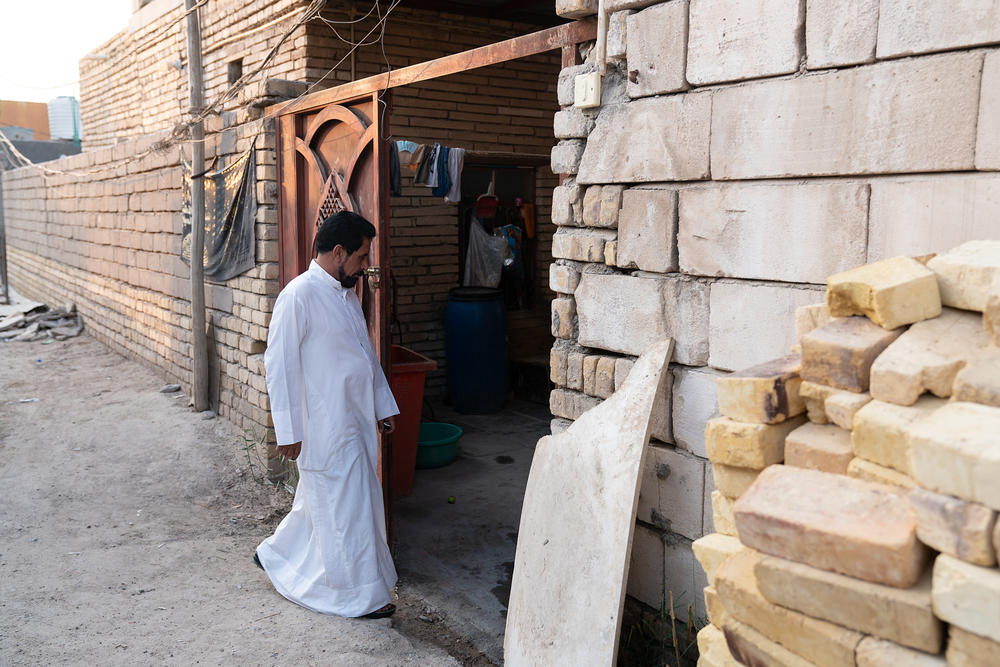Section Branding
Header Content
In Iraq's famed marshlands, climate change is upending a way of life
Primary Content
CHIBAISH, Iraq — A water buffalo, her stomach bloated and haunches sunken, lies dying on a dry expanse of cracked earth. Her calf nuzzles her but she doesn't respond. A few yards away, another water buffalo, all skin and bone, wallows in the mud at the edge of the drying marsh waters.
The people who herd these animals in Iraq's southern marshlands are unable to save them. Drought and extreme temperatures that scientists link to climate change are altering the habitat around them and slowly ending a way of life as old as civilization itself.
This once-fertile land of reed thickets and deep waterways was part of ancient Mesopotamia, often referred to as the cradle of human civilization. For thousands of years, people have lived off the fish and water buffalo of these fertile marshes.
This year, extreme heatwaves and low rainfall are turning parts of these fragile wetlands into a place so hostile that the communities who've lived here for generations are finding it impossible to remain. The entire marshlands area, which once covered up to 7,000-plus square miles, has shrunk significantly over time.
Parts still seem idyllic. During a visit in October, in the gentle dawn light, it was easy to see why some scholars believe these waterways were the original inspiration for the biblical Garden of Eden. Herons dive for fish in the dark waters, and sunrise meets a cacophony of birdsong. Warblers and black and white kingfishers dart among the green reeds.
Those reeds form the canopies of simple shelters where families sleep and live alongside their animals on small islands. They rise at first light and set about milking their water buffaloes. Then they load containers of the frothy liquid into rickety wooden boats, and speed to the nearby town of Chibaish to sell the fresh milk at the market.
Meanwhile, with a great crash of splashing water, the water buffalo herds head into the marsh waters where they spend their days wallowing in the cool, their muzzles just visible above the waterline.
As the afternoon shadows grow long, the animals return to be fed and bed down on land, near the people. Families often name each water buffalo in their herds and come to identify their individual traits.
But a short boat ride away from these tranquil scenes, the marshlands present a very different sight.
Temperatures in Iraq are rising faster than Earth's
The fertile marshland stops dead. It gives way to a vast expanse of baked land in which all that remains are desiccated bushes and reeds. With no birds, and the animals and humans fled, the silence is eerie.
There have been periodic droughts and dry summers here. But Razaq Jabar, a fisherman who was hired as NPR's guide in October, says he's never known this area to dry so completely. "Families living in this area all left," he says. "There are no fish, no reeds, no life."
Iraq relies on the Tigris and Euphrates rivers for as much as 90% of its freshwater. But years of reduced rainfall in the region are forcing countries to compete for this ever-diminishing resource. In recent years, damming projects in Turkey and Iran have reduced the levels of water reaching Iraq downstream.
Iraq's Ministry of Water Resources says river water flows into Iraq have dropped by more than a third from the 1970s to today. Meanwhile, the country's average annual temperatures are increasing at nearly double the rate of Earth's.
A study used by the United Nations Environment Programme found that Iraq is the fifth-most vulnerable country in the world to decreased water and food availability, extreme temperatures and associated health problems.
United Nations experts say Iraq is losing some 155 miles of arable land every year to desertification and soil erosion. Hameed al-Nayef, a spokesperson for Iraq's agriculture ministry, tells NPR that drought conditions this year are so bad that the country can produce on only about half the land it normally would.
In Iraq's south, the reduced river flows have caused saltwater currents from the Persian Gulf to intrude further upstream, tainting the freshwater of Iraq's UNESCO-protected marshlands. Experts say evaporation caused by extreme heat compounds the problem.
"These are the worst conditions we've ever experienced," says 25-year-old Majed Hameed, a water buffalo herder in a community that lives at the edge of one of the dried expanses.
People are leaving and animals are getting sick
Temperatures in southern Iraq have exceeded 125 degrees Fahrenheit in recent years.
In the marshlands, where there's no electricity for air conditioning or fans, many women and children have fled the heat to stay with relatives in towns and cities.
"Even the marsh water became so hot," says Hameed. "It looked like fire — as if it was boiling."
As its levels dropped, the marsh water became too salty for the water buffalo to drink. Hameed and other herders were forced to boat in fresh water for the animals from a river near the town of Chibaish.
Many of the water buffalo fell sick, he says. The reduced marsh waters contained higher than usual levels of fecal coliform bacteria. Herders also say their animals developed worms.
With scant access to veterinary care, the water buffalo started dying in numbers Hameed says he and his family have never seen in his lifetime as a herder. Every marshland family NPR spoke with said they'd lost more buffalo than usual this past summer.
After a year of debating with himself, as he watched his surroundings dry, Hameed says he's made the difficult decision to leave. In October, he sold three water buffalo. He plans to use those earnings to buy a pickup truck and move to the town of Amara, where he'll work delivering agricultural feed and other goods.
"This life has just become too difficult," he says.
Others are trying to move to other parts of the marshlands that haven't dried out. But they say it's increasingly difficult to find good places to settle with space for their buffalo, and herders are becoming more concentrated in the shrinking marsh areas.
In a country where years of war have already uprooted many lives, displacement for reasons of climate and environment is now becoming a common reality. In July 2019, the International Organization for Migration reported having identified 21,314 internally displaced people from Iraq's southern and central governorates — where the marshlands are located — due to the lack of access to clean water.
Many migrate to Iraqi cities, placing additional pressure on urban areas that already suffer from poor municipal services and infrastructure.
Those who've left are forced to adapt to life outside the marshes
In the impoverished city of Nasiriyah, about 60 miles from his original home in the marshlands, Hameed Hassab Ali is working as a taxi driver to try to support his nine children.
As the temperatures in the marshlands soared and rainfall lessened year after year, the changing climate became "a central topic of discussion in our family or tribal meetings," says Ali. "When we'd discuss our hardships with local officials from the government, they'd tell us they had no solutions as this is a problem that comes from beyond just Iraq's borders."
As a fisherman in the marshlands, Ali struggled with dwindling stock. After his father died in 2017, he received a share of the sale of his dad's home and saw his opportunity to leave.
Now he lives in a sparsely furnished home in a slum neighborhood. "As you can see, this is a poor neighborhood, without even paved street. But what can I do? This is what I can afford."
Every month Ali pays back part of the loan he took out to buy the taxi he drives. Earnings are very tight, but at least in the city he has a home with electricity and a fan with which he can help his family stay cooler.
Sometimes he yearns for the life he left behind: "I miss my community, and the tribal meeting where we'd gather to drink coffee and talk. I miss the abundance of fish and of birds. I'm always keen to return back to that life in these good times."
But he knows that even if he were to return to the marshlands, those good times are gone.
Copyright 2021 NPR. To see more, visit https://www.npr.org.
